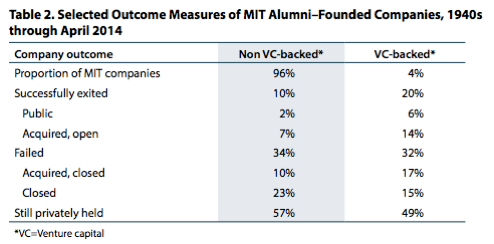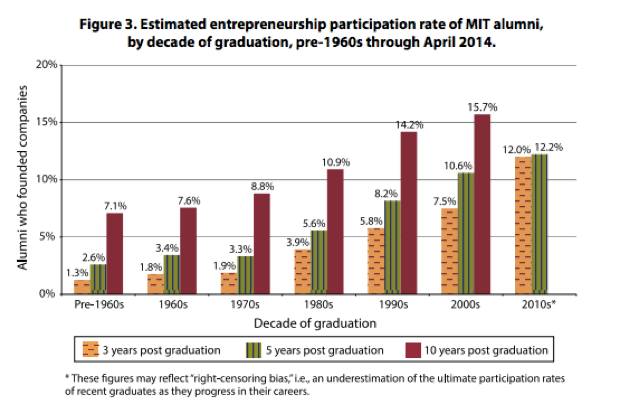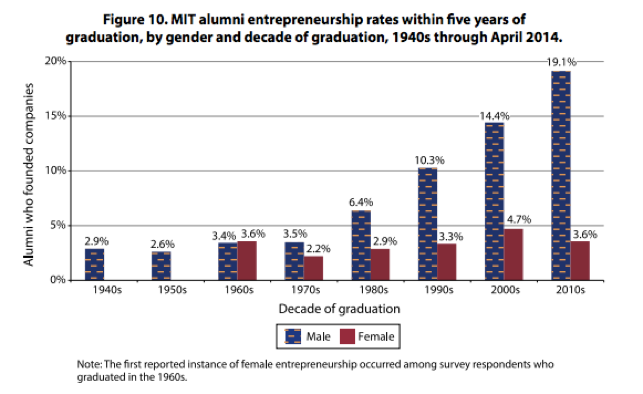
In our “Highlights Series” we strive to provide insights into the schools you are considering by looking at factors other than rankings.
For any aspiring entrepreneurs that might be considering applying to MIT, we want to share highlights of the impact that their entrepreneurial alumni have had around the world, and on the global economy.
MIT’s Survey Methodology:
“In early 2014, MIT sent email invitations to all its alumni to ask for assistance in helping to measure the Institute’s impact on the world through their entrepreneurial and innovation-related activities. Sent to 104,169 individuals in February, the MIT 2014 Alumni Survey of Innovation and Entrepreneurship garnered 19,730 responses by its close at the end of April.”
The survey was able to measure 30,000+ living companies, and considerably higher employment and revenue statistics than a previous survey in 2009. Additional limited data from a telephone survey suggest that the numbers reported are conservative.
For anyone interested in reading more detail on results of the survey and study, the full results are published here.
As of 2014, the report estimates, MIT alumni have:
- Launched 30,200 active companies
- The companies employed roughly 4.6 million people and
- Generated roughly $1.9 Trillion (with a “T”) in annual revenues
That revenue is falls between the GDP of Russia (9th largest in the world at $2.097 Trillion) and India (10th largest in the world at $1.877 Trillion).
In the 2000s, MIT alumni launched around 12,000 new companies; halfway through the current decade, the number of new firms started has already reached 9,100. According to the report, by the end of the decade, there could be 18 companies formed for every 100 alumni, a jump from 13.4 companies per 100 alumni in the 2000s.

Key results for entrepreneurial impact and trends are:
- 25 percent of MIT alumni have founded companies, with more than 40 percent of these labeled as “serial entrepreneurs” (those who founded two or more companies).
- 11 percent of alumni who have graduated in the 2010s have already founded companies, compared with 8 percent who founded companies within five years of graduating in the 1990s, and 4 percent in the 1960s.
- 80 percent of alumni-founded companies have survived five or more years, while 70 percent have survived 10 years. (Across the U.S., roughly 50 percent of all new companies last five years, while only 35 percent last 10 years.)
The report notes a declining age of MIT alumni founders, with the median age of first-time entrepreneurs decreasing steadily over the last eight decades. The age dropped from 39 for alumni who graduated in the 1940s to 30 in the 2000s, with today’s median age for entrepreneurs being 27.
Interestingly, the report has broken out figures for participation in entrepreneurship by decade of student attendance and gender, showing a clear trend that MIT’s entrepreneurial alumni have grown steadily decade over decade, and that there have been increasingly more female founders graduating from MIT starting around the 1960s.


We always encourage our clients to keep a big-picture perspective in mind as they consider which schools and programs to apply to, and also to think about the long-term value of the networks they will be associated with. In this case we can see that being a member of the MIT community could place you among an impressive list of business owners and entrepreneurs.
Will you go on to become an entrepreneurial alum of MIT, of Wharton, or some other school that is producing graduates that often make a significant impact on the world?
We will leave you today with three questions:
- What impact do you want to make on the world over the course of your career?
- What would be the first step you need to take in order to achieve that impact?
- What can we do to help?
Always feel free to reach out to our team at info@TranscendAdmissions.com, or schedule a no-pressure Free Consultation with us.
Sources: Entrepreneurship & Innovation at MIT, New report outlines MIT’s global entrepreneurial impact.
